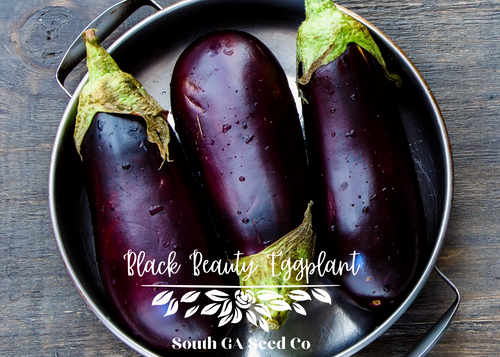★ Organically grown on our farm
Black Beauty, a prominent member of the Solanaceae family, shares its botanical lineage with popular crops such as tomatoes, potatoes, and peppers. This particular eggplant variant stands out as a captivating choice, boasting a lustrous deep purple exterior and substantial size. Renowned among chefs for its culinary merits, it bestows a touch of sophistication to traditional dishes like ratatouille, eggplant parmesan, and baba ghanoush. Its tender and substantial flesh lends itself gracefully to a myriad of recipes, seamlessly complementing both vegetarian and meat based creations.
Growing Black Beauty eggplants requires a warm climate; they thrive in temperatures between 70-85°F. These plants need full sun to produce their best yield; ensure they receive at least 6-8 hours of direct sunlight daily. Soil should be well-draining and rich in organic matter; adding compost can help achieve this. It's crucial to keep the soil consistently moist but not waterlogged; using mulch can help retain moisture and suppress weeds.
Black Beauty eggplants can be started from seeds indoors about 8-10 weeks before the last frost date. Transplant the seedlings outdoors once the danger of frost has passed and the soil has warmed. Space the plants about 18-24 inches apart to provide adequate air circulation and reduce the risk of disease. Regularly monitor for pests such as aphids and flea beetles; using insecticidal soap or neem oil can help manage these issues. With proper care, Black Beauty eggplants will produce bountiful harvests, typically ready for picking around 70-80 days after planting.
- QTY: 50
- Seed Planting Depth: 1/4"
- Germination Temperature: 70-90
- Days to Germination: 5-13
- Row Spacing: 24-36"
- Plant Spacing: 18-24"
- 100' Row Yield: 50 lb
- Sun: Full
- Harvest time: 80 days
How to Save Seeds
Eggplant is a self pollinator but will cross pollinate so with that in mind ¼ of a mile is sufficient for seed saving purposes. Allow them to remain on vine but off the ground. They will take on an a yellow to brown color before ready for harvesting seeds. Scope seeds out and over a bowl of water. Good seeds will sink bad seeds will float. Save seeds on bottom of bowl and allow them to dry out like the cucumber seeds.





